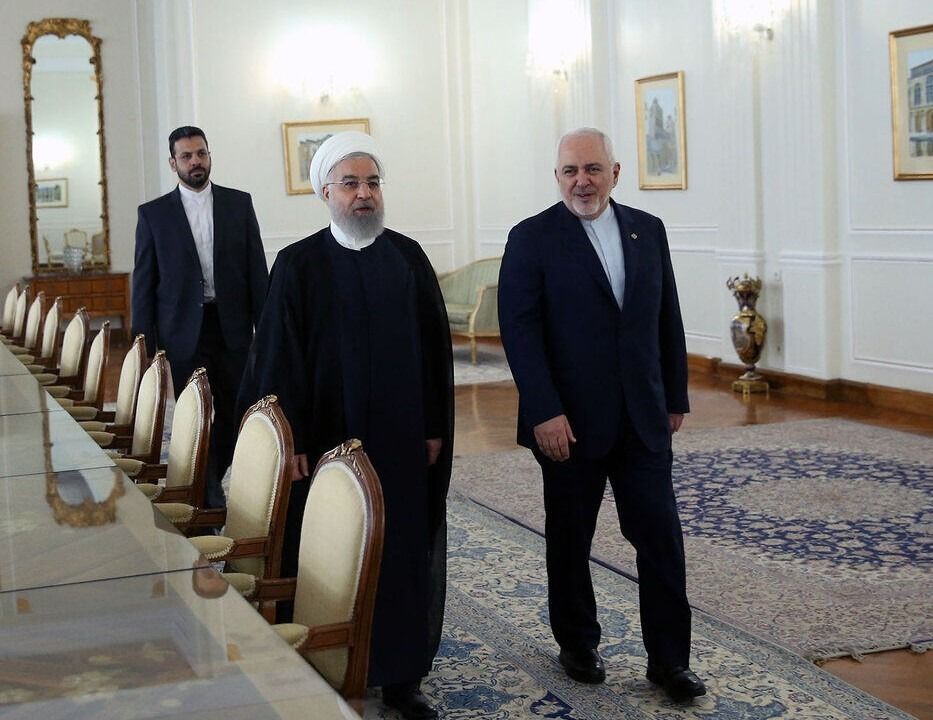New poll: Iranians are souring on the nuclear deal and don’t want a new one
By John Krzyzaniak | October 18, 2019
 Iranian President Hassan Rouhani and Foreign Minister Javad Zarif. Credit: Ahmad Moeinijam, Islamic Republic News Agency.
Iranian President Hassan Rouhani and Foreign Minister Javad Zarif. Credit: Ahmad Moeinijam, Islamic Republic News Agency.
Almost every aspect of Iranian President Hassan Rouhani’s approach to the nuclear agreement his country made with major world powers in 2015 finds broad support among the Iranian public. Put differently, the Trump administration’s “maximum pressure” campaign has not driven a wedge between Iran’s people and its government. That’s the main takeaway from a series of national surveys conducted by the University of Maryland and IranPoll, released this week.
The Iran nuclear deal, formally known as the Joint Comprehensive Plan of Action (JCPOA), was inked in July 2015. A month later, 76 percent of the Iranian public either “strongly approved” or “somewhat approved” of the agreement. As of October 2019, that number has dropped to 42 percent, its lowest point yet.
The Trump administration withdrew from the JCPOA in May 2018, but Iran continued to hold up its end of the bargain, hoping that the Europeans would continue delivering economic relief. In May 2019, after a year of European foot-dragging, Rouhani announced that Iran would begin taking steps to decrease its commitments to the deal. The survey shows 74 percent of Iranians supported this move, making it much more popular than the wait-and-see approach had been.
Donald Trump has said that he would be willing to meet with Rouhani without preconditions to renegotiate the nuclear deal. Rouhani rebuffed this offer, saying that he would only meet once US sanctions were lifted, and then only in a multilateral forum. The survey shows an Iranian public marching in lockstep; 75 percent support talks with the Trump administration if all sanctions are lifted and if the negotiations include all of the countries originally party to the JCPOA. Absent these two conditions, only 36 percent support talks.
Iran has also resisted the US desire to negotiate a grand bargain. At the G7 meeting in France in August, Trump suggested that such a bargain might cover a longer period of time and address Iran’s ballistic missile development. But only four percent of Iranians would support extending the JCPOA’s timeline in exchange for lifting nuclear-related sanctions. Even a deal that trades extra sanctions relief for longer timelines garnered only 35 percent support.
On the issue of missiles, 92 percent of respondents said that Iran’s missile development is either “very important” or “somewhat important,” and 58 percent see the ballistic missile program as non-negotiable. Here again, this echoes the Iranian government’s long-held position.
More broadly, the JCPOA experience has left a bad taste in Iranians’ mouths. Seventy-two percent now believe that the overarching lesson of the deal is that it isn’t worthwhile for Iran to make concessions because it can’t be confident that the other side will honor an agreement.
Publication Name: University of Maryland
To read what we're reading, click here
Together, we make the world safer.
The Bulletin elevates expert voices above the noise. But as an independent nonprofit organization, our operations depend on the support of readers like you. Help us continue to deliver quality journalism that holds leaders accountable. Your support of our work at any level is important. In return, we promise our coverage will be understandable, influential, vigilant, solution-oriented, and fair-minded. Together we can make a difference.
Keywords: Iran, JCPOA, maximum pressure, polls
Topics: Nuclear Risk, What We’re Reading
















Quelle surprise !
Henri